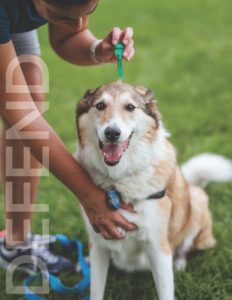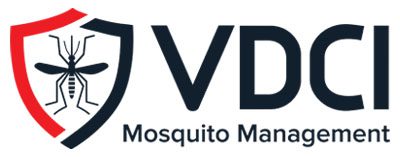Most of us know the dangers mosquitoes pose to humans across the globe, but it’s easy to forget about the toll vector-borne diseases can take on pets, particularly dogs and horses. Taking preventative measures to protect these animals is crucial. It’s also important to know and recognize the symptoms of infection to help ensure these animals receive swift care if they do contract a mosquito-borne disease – and understanding how threatening diseases spread can help break the cycle of disease transmission.
Heartworms
![]() If you’re a dog owner, your vet has likely warned you about Dirofilaria immitis, better known as heartworms. More than 250,000 dogs are diagnosed annually. After biting an infected animal, Aedes, Anopheles, and Mansonia mosquitoes can transmit this parasitic roundworm to many other species, including cats, foxes, raccoons, and wolves, but dogs are the natural host. As they mature over approximately 7 months, heartworms may grow up to 12 inches and survive for several years within a dog’s circulatory system.
If you’re a dog owner, your vet has likely warned you about Dirofilaria immitis, better known as heartworms. More than 250,000 dogs are diagnosed annually. After biting an infected animal, Aedes, Anopheles, and Mansonia mosquitoes can transmit this parasitic roundworm to many other species, including cats, foxes, raccoons, and wolves, but dogs are the natural host. As they mature over approximately 7 months, heartworms may grow up to 12 inches and survive for several years within a dog’s circulatory system.
Symptoms of Heartworm Disease in Dogs:
- Persistent cough
- Decreased appetite
- Weight loss
- Stunted growth
- Fatigue
- Anemia
- Fainting
Treatment of Heartworm Disease in Dogs
 Without proper treatment, most dogs will die from heartworm disease which is why it’s important to monitor your dog and seek medical guidance if your dog is experiencing any of the symptoms associated with heartworms. Luckily, treatment is typically successful and prescription medicine can be used to prevent the development of heartworms should a dog be bitten by an infected mosquito. There are also FDA-approved products to prevent heartworms in dogs. Depending on the severity and stage of the disease, surgical removal may be necessary.
Without proper treatment, most dogs will die from heartworm disease which is why it’s important to monitor your dog and seek medical guidance if your dog is experiencing any of the symptoms associated with heartworms. Luckily, treatment is typically successful and prescription medicine can be used to prevent the development of heartworms should a dog be bitten by an infected mosquito. There are also FDA-approved products to prevent heartworms in dogs. Depending on the severity and stage of the disease, surgical removal may be necessary.
Eastern Equine Encephalitis (EEE) Virus
Though mosquitoes are most known for infecting dogs with heartworms, which cannot be spread to humans, dogs can also contract other viruses like Eastern Equine Encephalitis (EEE), sometimes referred to as sleeping sickness. However, horses and other equids are the natural host of EEE. Culiseta melanura mosquitoes are the primary vector of this virus, but Coquillettidia pertubans, Aedes sollicitans, and Ochlerotatus canadensis may also contribute to the spread. This virus attacks and inflames the central nervous system (brain and spinal cord) of its host and is often fatal.
Symptoms of EEE in Horses:
- Fever
- Lack of appetite
- Muscle weakness
- Disorientation
- Blindness
- Seizures
- Paralysis
Treatment of EEE in Horses
 In 80-90% of EEE cases, the infection is fatal, and horses may die within a few days. Luckily, vaccinations are available to protect horses from infection. While rare, EEE can also be contracted by humans. Treatment can be effective for less severe infections, but even with treatment, the disease is fatal in approximately 30% of cases.
In 80-90% of EEE cases, the infection is fatal, and horses may die within a few days. Luckily, vaccinations are available to protect horses from infection. While rare, EEE can also be contracted by humans. Treatment can be effective for less severe infections, but even with treatment, the disease is fatal in approximately 30% of cases.
Heartworms and EEE are more commonly found in warmer, wetter climates, but can be contracted nearly anywhere in the country. While it’s crucial to keep animals up-to-date on their vaccinations and preventative medicine no matter where they are located, it’s equally important to understand how to protect ourselves from mosquito bites and mosquito-borne diseases:.
To help prevent mosquito bites, remember the 4 “Ds”
1. DEFEND
Consistently wear and reapply an EPA-approved repellent when outdoors
- The safest and most effective repellents should contain one of the following active ingredients:
- DEET
- Picaridin (known as KBR 3023 and icaridin outside the US)
- IR3535
- Oil of lemon eucalyptus (OLE)
- Para-menthane-diol (PMD)
- 2-undecanone
- Always follow manufacturer guidelines found on the label to ensure safe and optimal product use.
- Review the EPA’s list of registered insect repellents – www.epa.gov/insect-repellents/find-repellent-right-you
- Keep pets up to date on vaccinations and use preventative medications.
2. DRESS
Wear closed-toe shoes, light colors, and long sleeves and pants to keep your skin protected.
- Mosquitoes are more attracted to darker clothing.
Comfortable, loose-fitting clothes are more effective at preventing mosquito bites. - Bare skin on your hands, ankles, face, neck, or other areas should be protected with mosquito repellent.
3. DRAIN
Mosquitoes require standing water to complete their life cycle.
- Empty and prevent future water collection in outdoor tools and objects like tires, tarps, buckets, birdbaths, basketball goals, wheelbarrows, and lawn care equipment.
- Ensure water can drain properly from gutters, flower pots, watering cans, rain barrels, low-lying ditches, and stormwater pipes and structures.
4. DUSK & DAWN
Limit spending time outdoors when mosquitoes are most active.
- Mosquitoes can become dehydrated in direct sunlight.
- During the day, most mosquito species prefer cool, shaded places like thick weeds, ivy, bushes, and wood piles.
Self-protection – and the protection of your pets – is an essential part of an integrated mosquito management approach that incorporates public education, partnership with local community leaders and organizations, professional surveillance, monitoring, disease testing, and the use of pesticides when pre-determined action thresholds have been met. At VDCI, we are dedicated to driving the mosquito management industry forward through technological advancement and setting new standards for safety and efficiency, so people and animals can safely enjoy the outdoors.
Contact Us to Learn More About Effective Mosquito Prevention Strategies
 Since 1992, Vector Disease Control International (VDCI) has taken pride in providing municipalities, mosquito abatement districts, industrial sites, planned communities, homeowners associations, and golf courses with the tools they need to run effective mosquito control programs. We are determined to protect the public health of the communities in which we operate. Our mosquito control professionals have over 100 years of combined experience in the field of public health, specifically vector disease control. We strive to provide the most effective and scientifically sound mosquito surveillance and control programs possible based on an Integrated Mosquito Management approach recommended by the American Mosquito Control Association (AMCA) and Centers for Disease Control and Prevention (CDC). VDCI is the only company in the country that can manage all aspects of an integrated mosquito management program, from surveillance to disease testing to aerial application in emergency situations.
Since 1992, Vector Disease Control International (VDCI) has taken pride in providing municipalities, mosquito abatement districts, industrial sites, planned communities, homeowners associations, and golf courses with the tools they need to run effective mosquito control programs. We are determined to protect the public health of the communities in which we operate. Our mosquito control professionals have over 100 years of combined experience in the field of public health, specifically vector disease control. We strive to provide the most effective and scientifically sound mosquito surveillance and control programs possible based on an Integrated Mosquito Management approach recommended by the American Mosquito Control Association (AMCA) and Centers for Disease Control and Prevention (CDC). VDCI is the only company in the country that can manage all aspects of an integrated mosquito management program, from surveillance to disease testing to aerial application in emergency situations.

